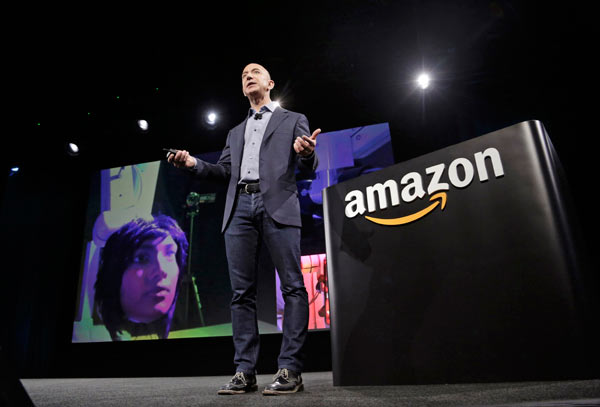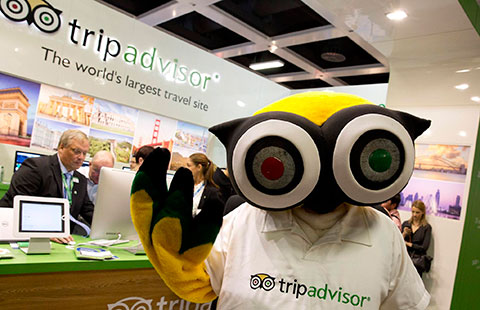Will Alibaba, Amazon clash?
Updated: 2015-07-03 11:29
By William Hennelly(China Daily)
|
||||||||
 |
|
Amazon.com Inc CEO Jeff Bezos discusses his company's Fire device at a news conference in Seattle in June 2014. Provided to China Daily |
Cost of entry
Frank Lavin, founder and CEO of Export Now in Akron, Ohio, which provides consulting services for businesses accessing China's e-commerce platforms, said that China is the easiest market for US companies to enter, but smaller companies - in the $1 million to $10 million range - will have a tough go.
To get online on Alibaba, a company would have to design and build a Chinese-language website, pay for trademark registration and put up a deposit, which could cost companies from $50,000 to $100,000, Lavin told China Daily. To advertise, companies may have to spend another $100,000 to $200,000, he said.
"I would say, in terms of value, cost-benefit for a company, that's fantastic," Lavin said. "That's one of the best deals a company's ever going to see. But again, if your total sales are $2 million, and it's $50,000 to $100,000 just to get in the game, that's 5 percent of your total sales."
"It is difficult for either of these platforms (Alibaba and Amazon) to replicate their success in the other market," Lavin said. "So the natural tactic for Tmall in the US is not to compete directly with Amazon in selling into the US market, but to offer US merchants a path to selling in China."
Tmall charges sellers much less than Amazon does on sales. Taobao's consumer-to-consumer marketplace is free to use, but Alibaba makes money by selling advertising and providing other services.
"There is less cost in the Alibaba ecosystem," Wingo told cnet.com. "The Alibaba business model has proven to work against eBay and Amazon in China."
If Ma's main US goal is to bring more products to his home country, he will be doing it with a company that has a far better profit margin and a competitive advantage costwise over its main e-commerce rival Amazon.
Alibaba has grown exponentially without the cost pressure of managing its own warehouses and inventory. Amazon owns warehouses and distribution centers and some of its own products and inventories.
Considering the companies as investments, Alibaba has a profit margin of about 32 percent. Amazon is operating at a loss, with a trailing 12 months' margin of -0.44 percent.
The companies are fairly comparable on market capitalizations, with Alibaba's at $212.7 billion as of June 25, when shares closed at $85.24 on the New York Stock Exchange. (The NYSE also is where Alibaba raised a world-record $25 billion in its initial public offering in September 2014).
Amazon has a market cap of $203.2 billion, and its shares, which are up 45 percent year to date, closed at $440.10 on June 25. The stock has a forward price-to-earnings ratio of 164.22, which means it is pricey, but investors are obviously willing to pay for future growth.
Alibaba's forward P/E ratio is only 22.91, according to Capital IQ. The forward P/E on the bellwether S&P 500 index is around 20.
- Injured ROK tourists in intensive care
- 36 dead, 26 missing after banca capsized in C. Philippines
- Thai navy plans to buy three Chinese subs
- Mass casualties in Indonesian military plane crash
- Japan's LDP lawmaker denounces Abe's security policies
- More than 100 feared dead in Indonesian military plane crash

 Across America over the week (June 26-July 2)
Across America over the week (June 26-July 2)
 Solar-powered plane breaks solo flight record
Solar-powered plane breaks solo flight record
 A soap maker's fragrant life
A soap maker's fragrant life
 Ten photos you don't wanna miss - July 3
Ten photos you don't wanna miss - July 3
 Cooling off to escape the heat wave
Cooling off to escape the heat wave
 Top 10 best hotel booking apps for Android
Top 10 best hotel booking apps for Android
 Western Europe swelters in long-lasting heat wave
Western Europe swelters in long-lasting heat wave
 Top 10 shareholders of AIIB
Top 10 shareholders of AIIB
Most Viewed
Editor's Picks

|

|

|

|

|

|
Today's Top News
Will Alibaba, Amazon clash?
China-France ties 'benefit all'
Veteran diplomat in Havana shortlisted for ambassador
Solar-powered plane breaks solo flight record
California mulls move to 'zero-emission buses'
Move to Houston pays off with new business
IPR law acted out
Economic growth driving force for China's future mobility: Think tank
US Weekly

|

|







